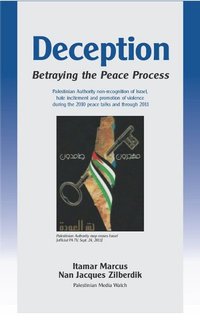
The Israeli–Palestinian conflict, is an ongoing military and political conflict about self-determination within the territory of the former Mandatory Palestine. Key aspects of the conflict include the Israeli occupation of the West Bank and Gaza Strip, the status of Jerusalem, Israeli settlements, borders, security, water rights, Palestinian freedom of movement, and the Palestinian right of return.
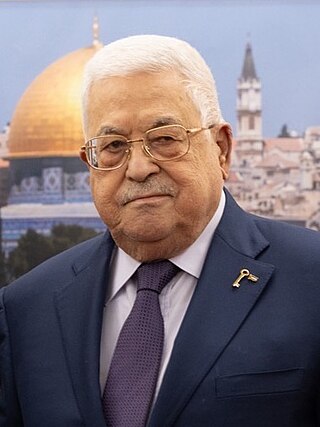
Mahmoud Abbas, also known by the kunya Abu Mazen, is the president of the State of Palestine and the Palestinian National Authority (PNA). He has been the chairman of the Palestine Liberation Organization (PLO) since 2004, PNA president since January 2005, and State of Palestine president since May 2005. Abbas is also a member of the Fatah party and was elected chairman in 2009.

Dalal Mughrabi was a Palestinian militant who was a member of the Fatah faction of the Palestine Liberation Organization (PLO) and participated in the 1978 Coastal Road massacre in Israel. The attack resulted in the death of 38 Israeli civilians, including 13 children. Mughrabi and eight other militants were also killed in the course of the operation. While she has been hailed as a martyr and a national hero among many Palestinians, Israel and the United Nations have described her as a terrorist.

Intermittent discussions are held by various parties and proposals put forward in an attempt to resolve the ongoing Israeli–Palestinian conflict through a peace process. Since the 1970s, there has been a parallel effort made to find terms upon which peace can be agreed to in both the Arab–Israeli conflict and in the Palestinian–Israeli conflict. Notably the Camp David Accords between Egypt and Israel, which included discussions on plans for "Palestinian autonomy", but did not include any Palestinian representatives. The autonomy plan would not be implemented, but its stipulations would to a large extent be represented in the Oslo Accords.
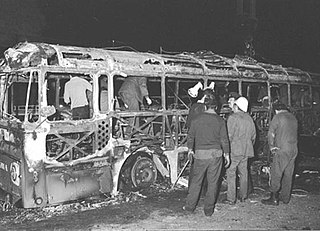
The Coastal Road massacre occurred on 11 March 1978, when Palestinian militants hijacked a bus on the Coastal Highway of Israel and murdered its occupants; 38 Israeli civilians, including 13 children, were killed as a result of the attack while 76 more were wounded. The attack was planned by the influential Palestinian militant leader Khalil al-Wazir and carried out by Fatah, a Palestinian nationalist party co-founded by al-Wazir and Yasser Arafat in 1959. The initial plan of the militants was to seize a luxury hotel in the Israeli city of Tel Aviv and take tourists and foreign ambassadors hostage in order to exchange them for Palestinian prisoners in Israeli custody.
Textbooks in Israel and the Palestinian territories have been an issue within the larger Israeli–Palestinian conflict.
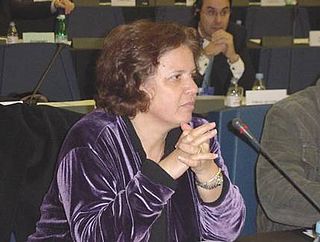
Nurit Peled-Elhanan is an Israeli philologist, professor of language and education at the Hebrew University of Jerusalem, translator, and activist. She is a 2001 co-laureate of the Sakharov Prize for Freedom of Thought awarded by the European Parliament. She is known for her research on the portrayal of Palestinians in Israeli textbooks, which she has criticized as being anti-Palestinian. Elhanan supports the Boycott, Divestment and Sanctions (BDS) movement.
The Institute for Monitoring Peace and Cultural Tolerance in School Education (IMPACT-SE), formerly known as the Center for Monitoring the Impact of Peace (CMIP), is an Israeli non-profit organization that monitors the content of school textbooks, specifically how they educate in relation to religion, societies, cultures, democratic values and the 'Other'. It examines school curricula worldwide, to determine whether the material conforms to international standards as derived from UNESCO declarations and resolutions, advocating for change when necessary. The organization believes that education should be utilized to encourage tolerance, pluralism and democracy, and promote peaceful means of solving conflicts.

Tomorrow's Pioneers, also known as The Pioneers of Tomorrow, is a Palestinian children's television show. The series was broadcast by the Hamas-affiliated television station Al-Aqsa TV from April 13, 2007 to October 16, 2009, and featured young host Saraa Barhoum and her co-host Farfour, a large Mickey Mouse-like costumed character, performing skits and discussing life in Palestine in a talk show fashion with call-ins from children. Presented in a children's educational format similar to such other preschool shows as Sesame Street or Barney & Friends, Tomorrow's Pioneers is highly controversial as it contains antisemitism, Islamism, anti-Americanism, and other anti-Western themes.
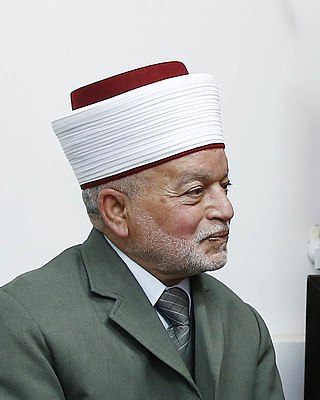
Muhammad Ahmad Hussein is the incumbent Grand Mufti of Jerusalem. He was appointed in July 2006 by Mahmoud Abbas, the President of the Palestinian National Authority. Abbas raised Hussein as an immediate successor to Ekrima Sa'id Sabri, who was reportedly removed from the position due to his growing popularity amidst his open expressions of highly contentious political views and his condoning of violence in the Israeli–Palestinian conflict.
Fathi Ahmad Hamad is a Palestinian politician and member of the Hamas political bureau. He was Interior Minister in the Hamas-administered Gaza Strip from 2009 to 2014.
On 10 February 2010, Palestinian Authority police officer Muhammad Hatib stabbed Druze Israeli soldier Ihab Khatib to death as the latter was sitting in a jeep at a traffic light. The attack was considered part of an "emerging trend" at the time, involving assaults on Israelis by members of the Palestinian Authority security services.
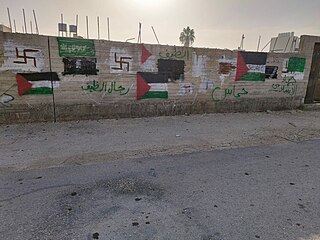
Racism in the Palestinian territories encompasses all forms and manifestations of racism experienced in the Palestinian Territories, of the West Bank, Gaza, and East Jerusalem, irrespective of the religion, colour, creed, or ethnic origin of the perpetrator and victim, or their citizenship, residency, or visitor status. It may refer to Jewish settler attitudes regarding Palestinians as well as Palestinian attitudes to Jews and the settlement enterprise undertaken in their name.
Durban III is an informal name for a high-level United Nations General Assembly meeting marking the 10th anniversary of the adoption of The Durban Declaration and Programme of Action that was held in New York City on 22 September 2011. It was mandated by United Nations General Assembly (UNGA) resolution 64/148 of 18 December 2009 to commemorate the World Conference against Racism 2001, and given additional form and visibility by a UNGA Third Committee draft resolution adopted on 24 November 2010. It followed the Durban Review Conference, the official name of the 2009 United Nations World Conference Against Racism (WCAR), also known as Durban II.
In June 2012, Israel, handed over the remains of 91 Palestinian suicide bombers and other militants, who died while carrying out attacks against Israeli targets, as part of a goodwill gesture to PA chairman Mahmoud Abbas to help revive the peace talks and reinstate direct negotiations between Israel and the Palestinians, although President Mahmoud Abbas did not indicate whether he was willing to return to talks. American Secretary of State Hillary Clinton said that there was an opportunity for negotiations and hoped that this move had enhanced it.

Palestinian Media Watch is an Israel-based nongovernmental organization and media watchdog group. Founded in 1996 by Itamar Marcus, Palestinian Media Watch documents cases of incitement in Palestinian media. It describes itself as "an Israeli research institute that studies Palestinian society from a broad range of perspectives by monitoring and analyzing the Palestinian Authority through its media and schoolbooks."

On 3 October 2015, a Palestinian resident of al-Bireh attacked the Benita family near the Lions' Gate in Jerusalem, as they were on their way to the Western Wall to pray. The attacker murdered Aaron Benita, the father of the family, and injured the mother Adele and their 2-year-old son Matan. Nehemia Lavi, a resident who heard screams and came to help was also murdered and his gun taken by the assailant. The attacker, 19 year old Muhanad Shafeq Halabi was shot and killed by police as he was firing on pedestrians.

An increase of violence occurred in the Israeli–Palestinian conflict starting in the autumn of 2015 and lasting into the first half of 2016. It was called the "Intifada of the Individuals" by Israeli sources, the Knife Intifada, Stabbing Intifada or Jerusalem Intifada by international sources because of the many stabbings in Jerusalem, or Habba by Palestinian sources. 38 Israelis and 235 Palestinians were killed in the violence. 558 Israelis and thousands of Palestinians were injured.
On 30 June 2016, a 17-year-old Palestinian male broke into a home in the Israeli settlement of Kiryat Arba and stabbed to death Hallel Yaffa Ariel a thirteen year old Israeli-American citizen in her bedroom. The attacker was then fatally shot by security guards. Israeli Prime Minister Benjamin Netanyahu blamed "incitement-driven terrorists" while the U.S. State Department condemned the "outrageous terrorist attack".

On the morning of 26 September 2017, a Palestinian gunman opened fire at Israeli security guards at the entrance gate of Har Adar, an Israeli settlement and affluent residential border community of Jerusalem located largely on the other side of the green line within the West Bank. Three Israeli security guards were killed and one was injured. The gunman was shot dead by the remaining guards. The Israeli authorities described the attack as an 'act of terrorism'.
